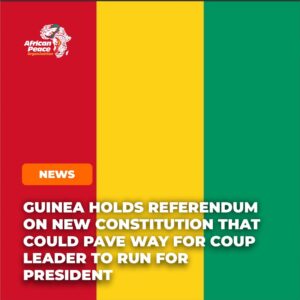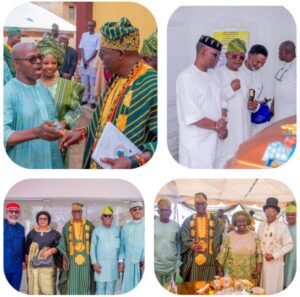Guinea Holds Referendum on New Constitution That Could Pave Way for Coup Leader to Run for President
Draft extends presidential term, allows military figures to contest elections, and restricts opposition as critics warn of a democratic rollback.
On Sunday, September 21, Guinea voted in a constitutional referendum that could change the country’s future by making presidential terms longer, allowing military leaders to run for office, and giving the president more power over parliament.
The draft constitution would extend presidential mandates from five to seven years and remove a ban that prevented military rulers from running for office during the transition. It also introduces a new Senate in which one-third of members would be directly appointed by the president.
If adopted, the changes would clear a path for interim leader General Mamady Doumbouya — who seized power in a September 2021 coup — to run in elections expected later this year. Doumbouya, 44, had initially promised to return Guinea to civilian rule by 2024, but his critics say the reforms are designed to entrench his hold on power.
Major opposition parties, including the Rally of the Guinean People (RPG) and the Union of Democratic Forces of Guinea (UFDG), were suspended ahead of the referendum. Independent media faced restrictions, while opposition rallies were banned.
Former president Alpha Condé and opposition leader Cellou Dalein Diallo urged citizens to boycott the vote, warning that Guineans were excluded from meaningful debate on the draft. “This referendum is neither free nor fair,” Diallo said in a statement, accusing the junta of using the process to “legitimize military rule through a civilian disguise.”
Human rights groups also voiced concern over a lack of transparency and a crackdown on dissent. Amnesty International said the environment leading up to the vote was “incompatible with a credible democratic process.”
The “Yes” campaign has been highly visible across Conakry, with rallies, Quran readings, concerts, and posters urging citizens to back the new charter. Government officials insist the reforms are needed to modernize institutions and create stability after years of unrest under previous administrations.
“The new constitution will strengthen Guinea’s democracy and open a new chapter for our country,” government spokesman Ousmane Gaoual Diallo said last week.
The referendum places Guinea alongside a growing list of West African countries, including Mali, Niger, and Burkina Faso, where military leaders have delayed or reshaped promised transitions to civilian rule. Analysts warn that the trend could weaken regional commitments to democracy and embolden juntas elsewhere.
“Guinea’s referendum is less about returning to civilian governance and more about legalizing military rule,” said Remadji Hoinathy, a senior analyst at the Institute for Security Studies. “It sends a signal to other regimes in the region that promises of transition can be stretched indefinitely”, he added.
Official results are expected in the coming days, though turnout figures will be closely scrutinized given opposition calls for a boycott. If approved, the new constitution would formally replace the transition charter and set the stage for presidential elections in December.
For Doumbouya, the vote could provide the legal foundation to transform his role from coup leader to elected president. For Guinea’s opposition, however, it marks a step backward from democratic norms the country has struggled to build over the past two decades.
Source: Africanews





